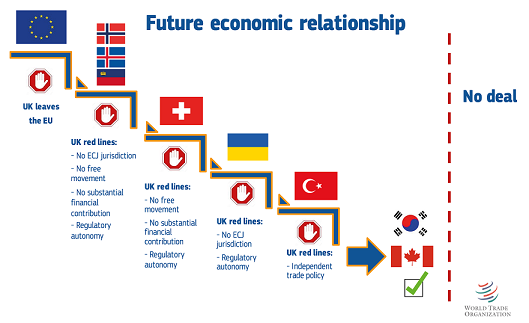
“That couldn’t happen” are probably the 3 most dangerous words in the English language. They mean “I don’t want to think about something that might be painful“. So if you hear MPs saying a “No Deal Brexit can’t happen“, ignore them. They are wrong.
‘NO DEAL’ BREXIT IS THE LAW OF THE LAND
The issue is simple, yet seemingly too painful for most MPs and commentators to accept.
The EU Withdrawal Act (2018) became law on 26 June last year. It set 29 March 2019 as Brexit Day. It allowed for a Transition Agreement if a Withdrawal Agreement was agreed. Without a Withdrawal Agreement, the UK simply leaves with No Deal.
The law is the law, and the Act is primary legislation, which means it has since been incorporated in a whole range of laws and regulations as part of the UK’s exit preparations. It cannot, therefore, be overturned by statements that claim “There is no majority for No Deal”.
In fact, during the Committee stage, the House of Commons voted 320-114 in Committee Stage against staying in the Customs Union. It also voted 319-23 against a second referendum. And last week, MPs voted against the proposed Withdrawal Agreement.
So if MPs say “No Deal can’t happen”, they are wrong. They have already voted for ‘No Deal’.
CHANGING PRIMARY LEGISLATION IS VERY HARD

Of course, MPs could still change their minds. But there are now less than 70 days till Brexit. And they would also have to agree this with the other EU 27 countries. These represent nearly 450 million people versus the UK’s 66 million.
Equally important is that the UK has been heading in this direction since negotiations started:
- As I noted in September 2016 (If “Brexit means Brexit”, what does Brexit mean?), the Institute for Government had already identified the main options
- And on 17 January 2017, new prime minister Theresa May reconfirmed her Conference speech ruling out most of these options, and suggested that “No Deal for Britain is better than a bad deal“
- Negotiating a Canada/Singapore-style Free Trade Agreement would likely take years (I’ve done these in the past), so No Deal is also the default position while this takes place
- This position was later summarised in the above EU slide, and nobody has since disagreed with it
Since then, MPs have voted for the Withdrawal Act; against remaining in a Customs Union; against a new referendum; and against the Withdrawal Agreement. They have also voted for invoking Article 50 and for setting 29 March 2019 (by a majority of 384 votes) as Brexit Day.
So time is running out for them to change their minds.
THE ALTERNATIVES TO ‘NO DEAL’ ARE CURRENTLY WISHFUL THINKING

The politics of Brexit also make it unlikely that the government will change its mind, or be forced to change its mind:
- Theresa May knows very well that any move to “soften” Brexit by joining a Customs Union would split her Conservative Party down the middle. And any Tory MP who voted for a softer Brexit knows they would likely be deselected as a candidate and lose their job
- Labour leader Jeremy Corbyn voted to leave the EU in the 1975 referendum, and against the Maastricht/Lisbon Treaties. Many traditional Labour voters are also strongly pro-Leave. So any Labour MP voting against the Party line also faces the risk of deselection
It is therefore hard to see why simply extending Article 50 beyond 29 March would change anything.
And extending would enormously complicate the European elections in May. At the moment, the UK is not taking part in these, as it is leaving on 29 March. But if it isn’t leaving after all, there is little time left to prepare to vote on 23 May
Of course, the EU27 might agree an extension if the UK decided to hold a second referendum, as long as the vote was held before the new Parliament starts work on 2 July. But they would likely first want to know the question on the ballot paper.
Would the government ask if the voters approved of May’s Withdrawal Agreement? Would it instead ask if they wanted to stay in the EU? Or would it simply ask if they wanted to leave with No Deal?
Any of these questions are possible. But deciding between them could be very divisive in itself. And a referendum campaign could be even more divisive. Plus, its outcome would be very uncertain if voters worried that democracy was being undermined by a refusal to accept the first result.
“A week is a long time in politics”as former premier Harold Wilson famously noted. So it is possible that Sir Keir Starmer’s call yesterday for a new Labour approach might succeed. Equally, MPs might decide to support the Nick Boles and/or the Dame Caroline Spelman/Jack Dromey motions next week.
But this would only be the start of a quite complex process, which might well end with a General Election being called – and all the while, the clock is ticking.
So after the government’s defeat on Tuesday, UK businesses and those that trade with the UK must urgently begin to plan on the basis that a No Deal Brexit on 29 March is now UK law.
Please consider joining Ready for Brexit today (the advisory service I launched in June). It is effectively the one-stop shop requested by the CBI, and provides curated links to all the areas where businesses may need to prepare for Brexit.

